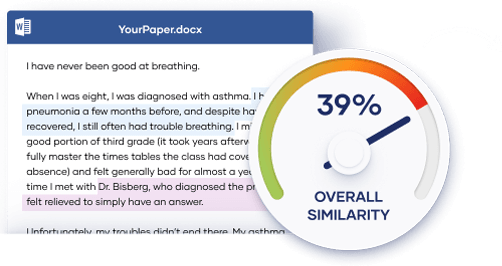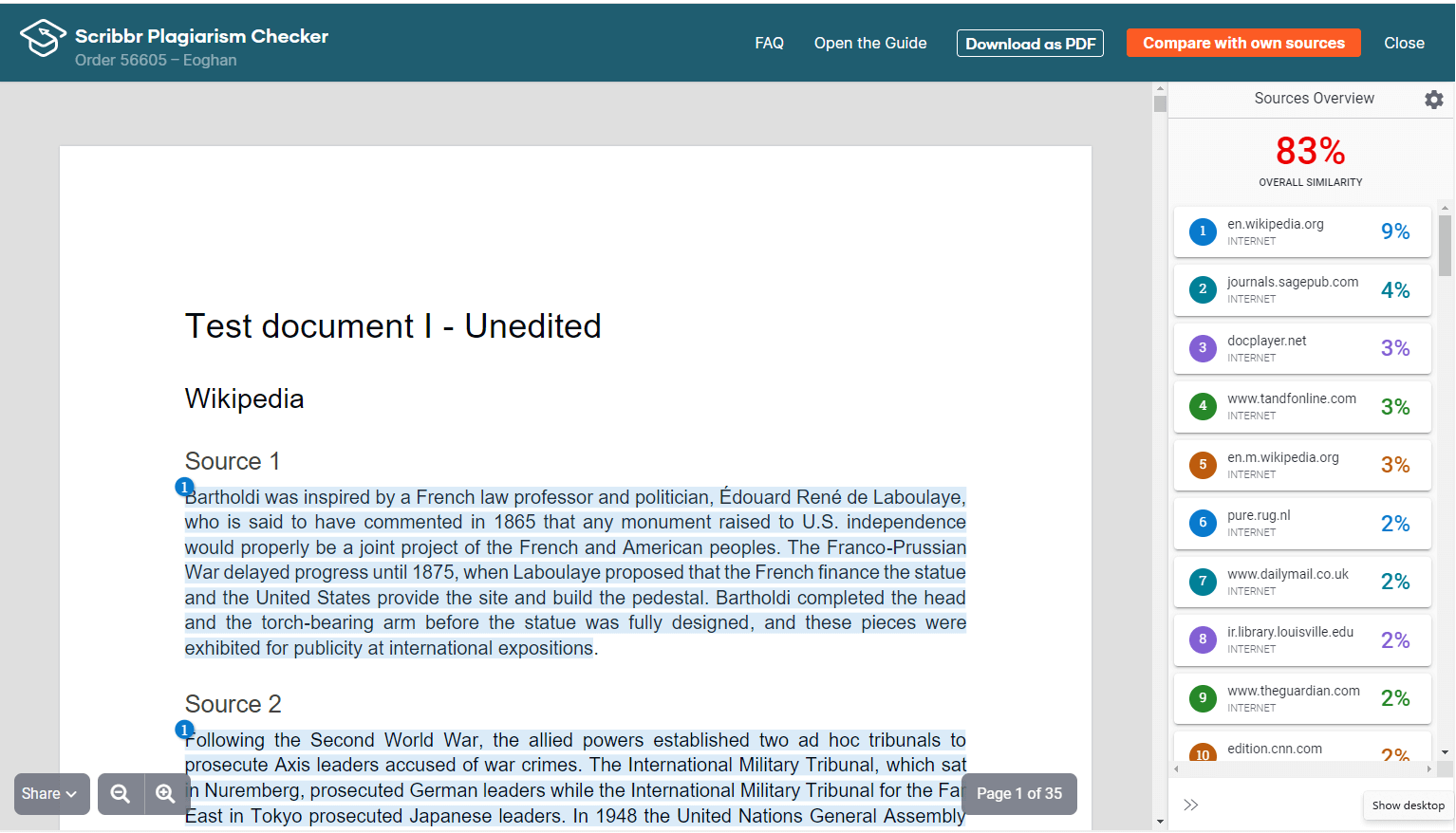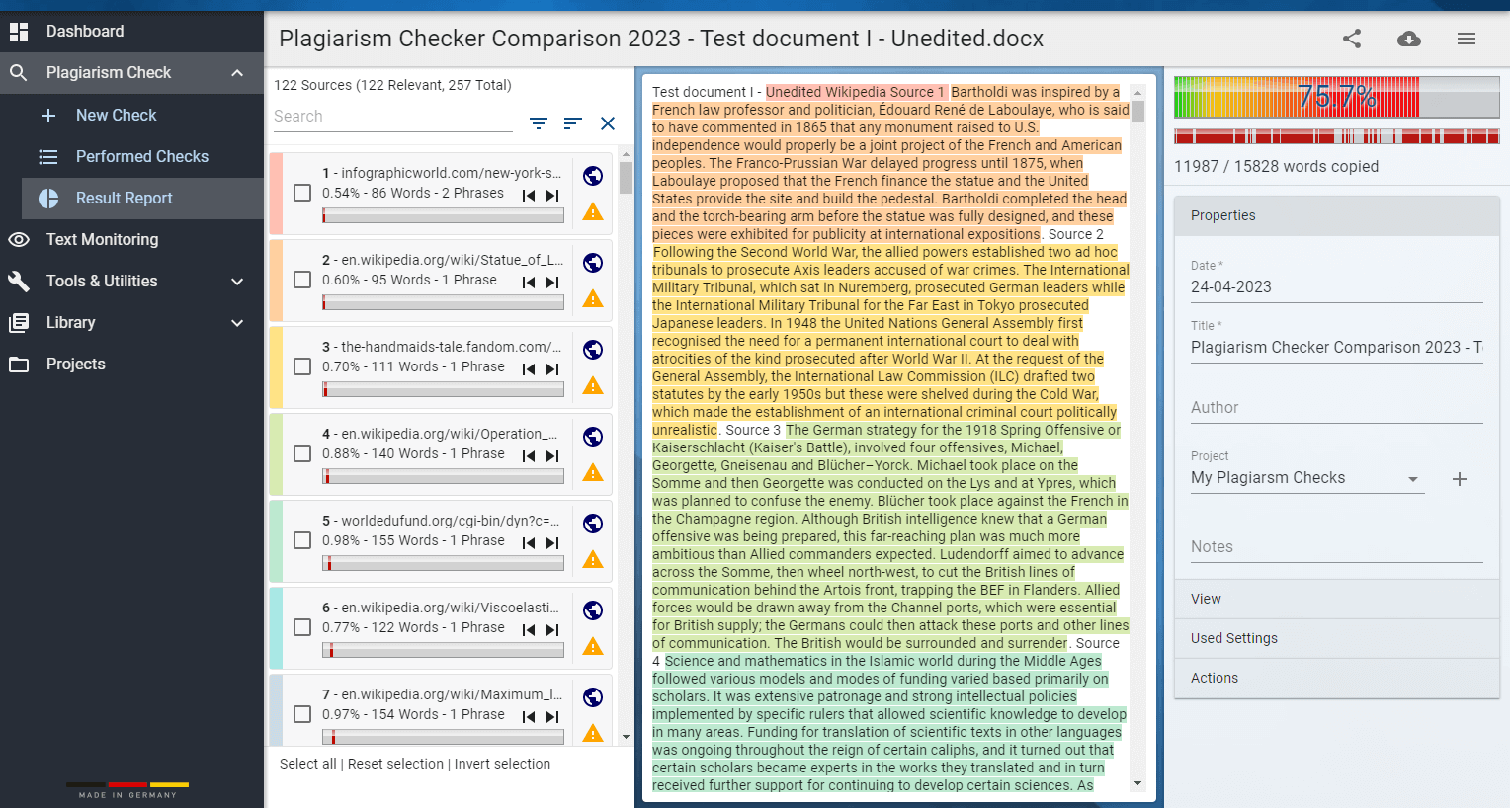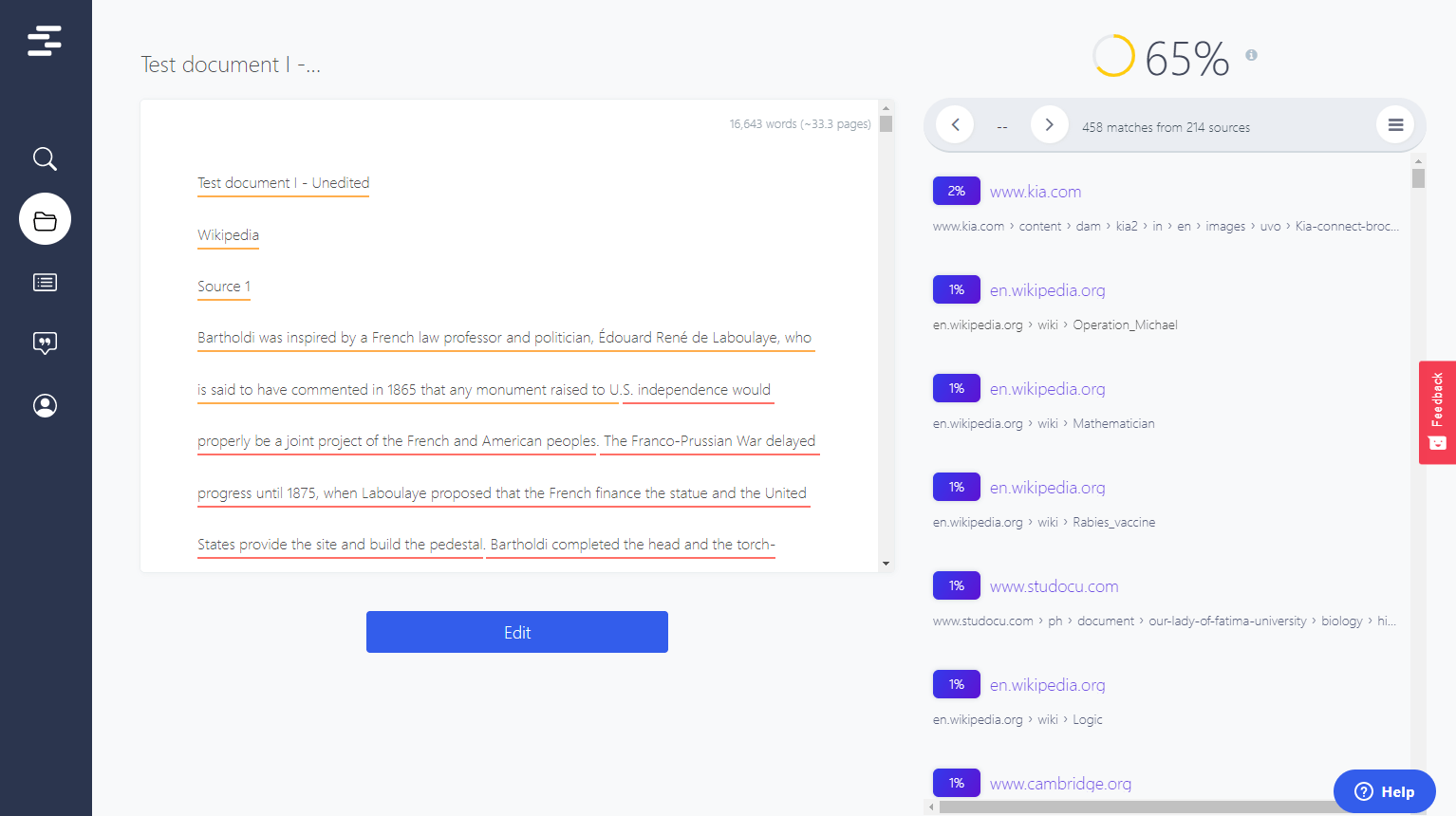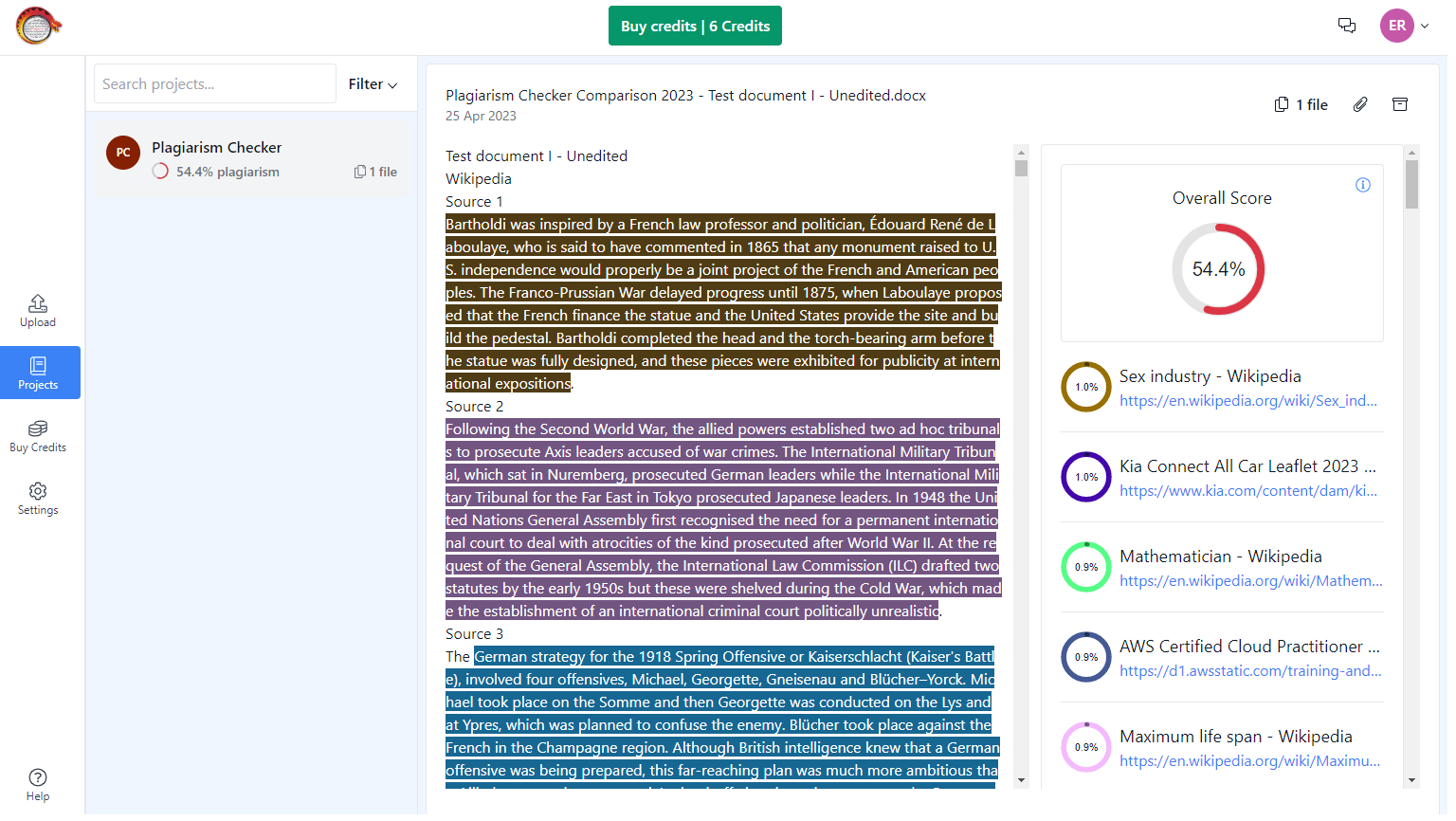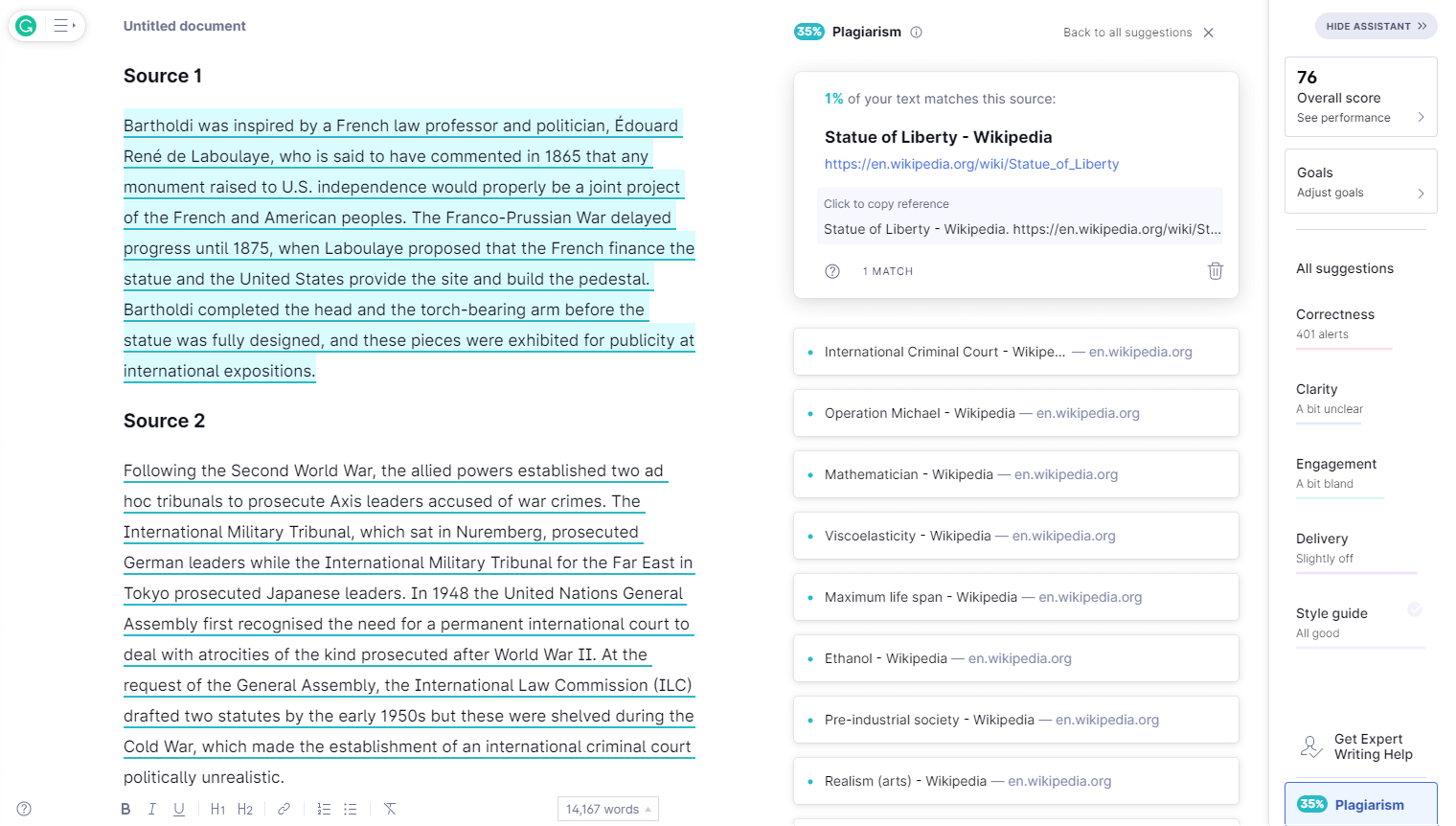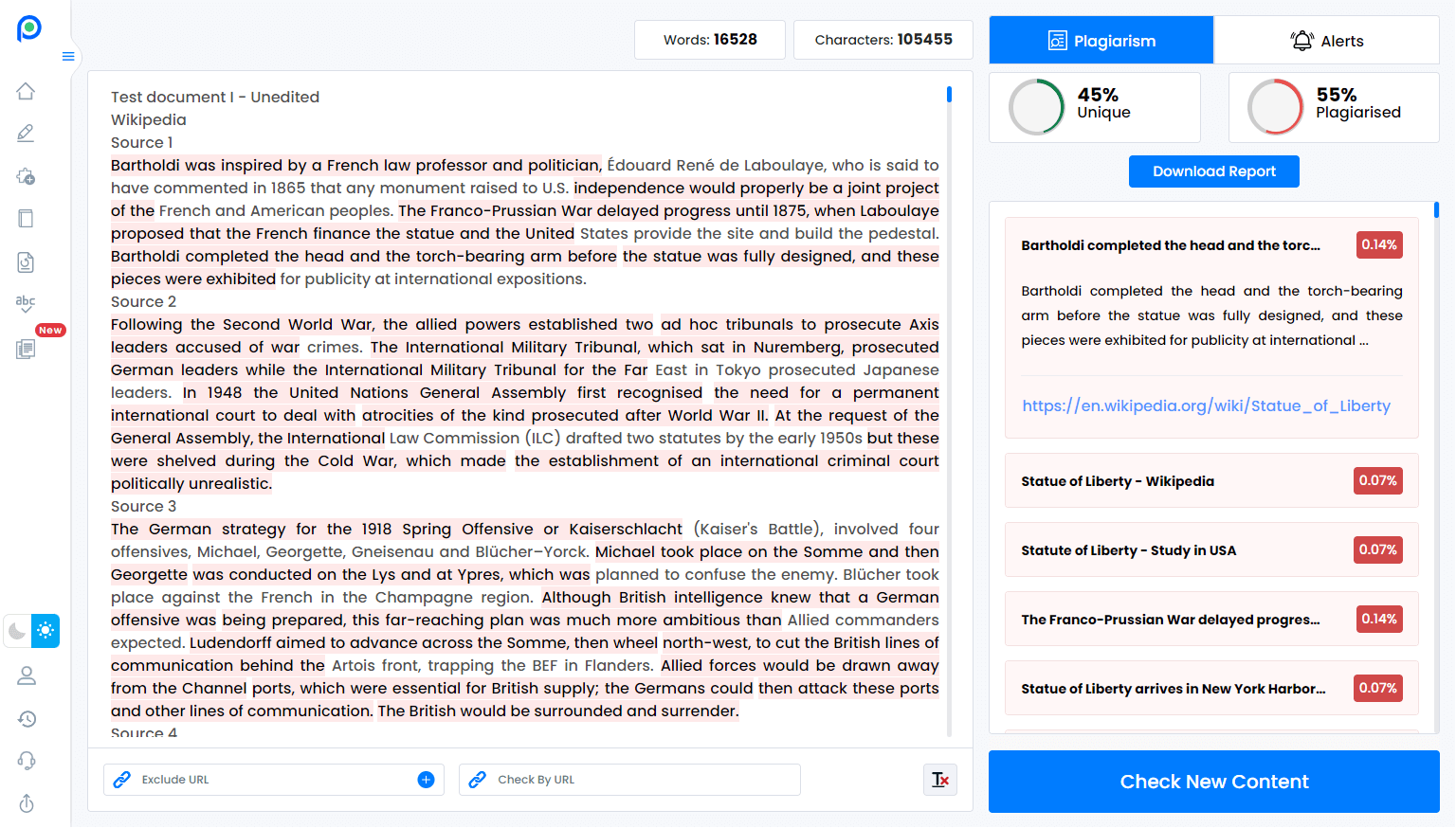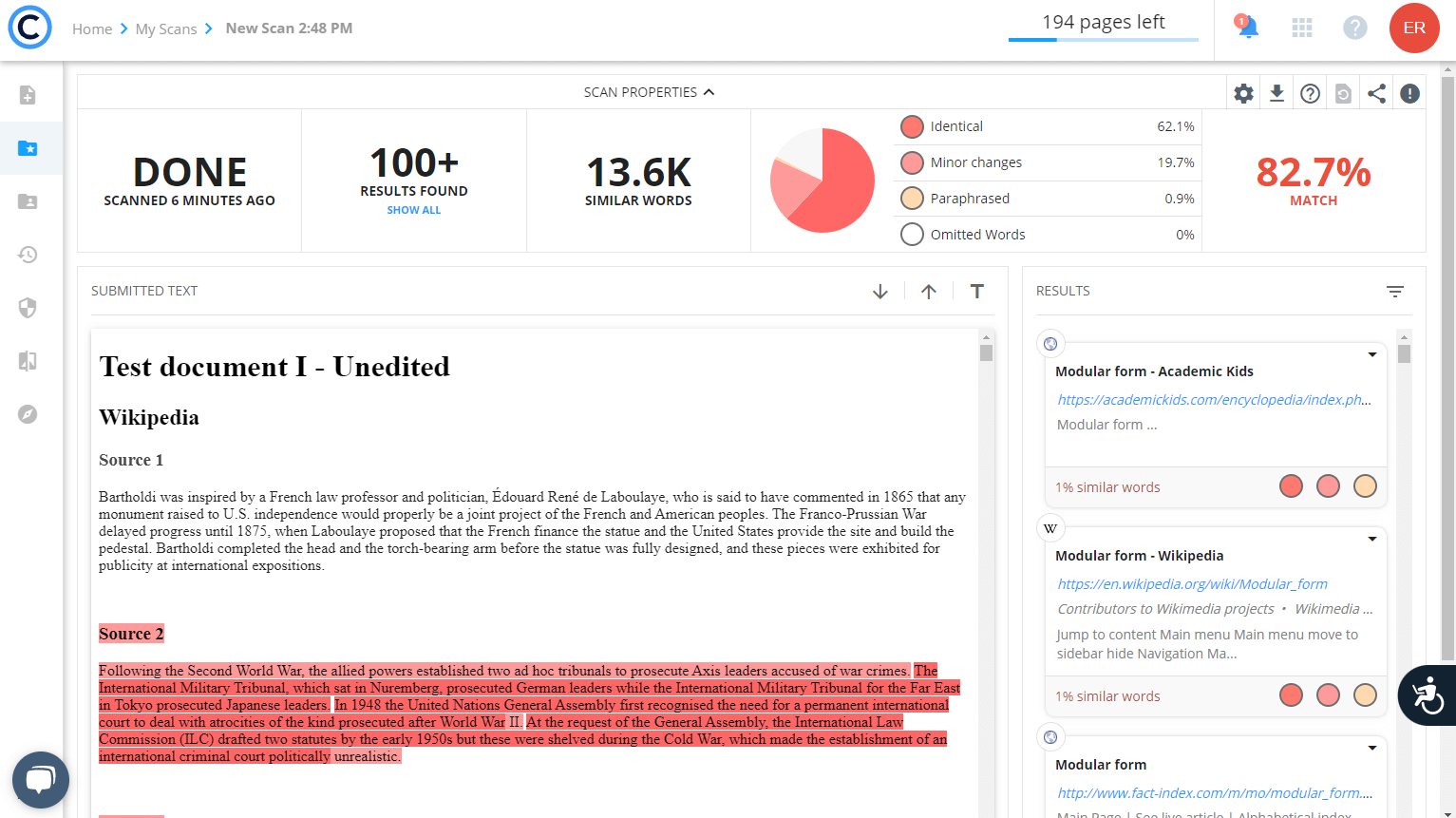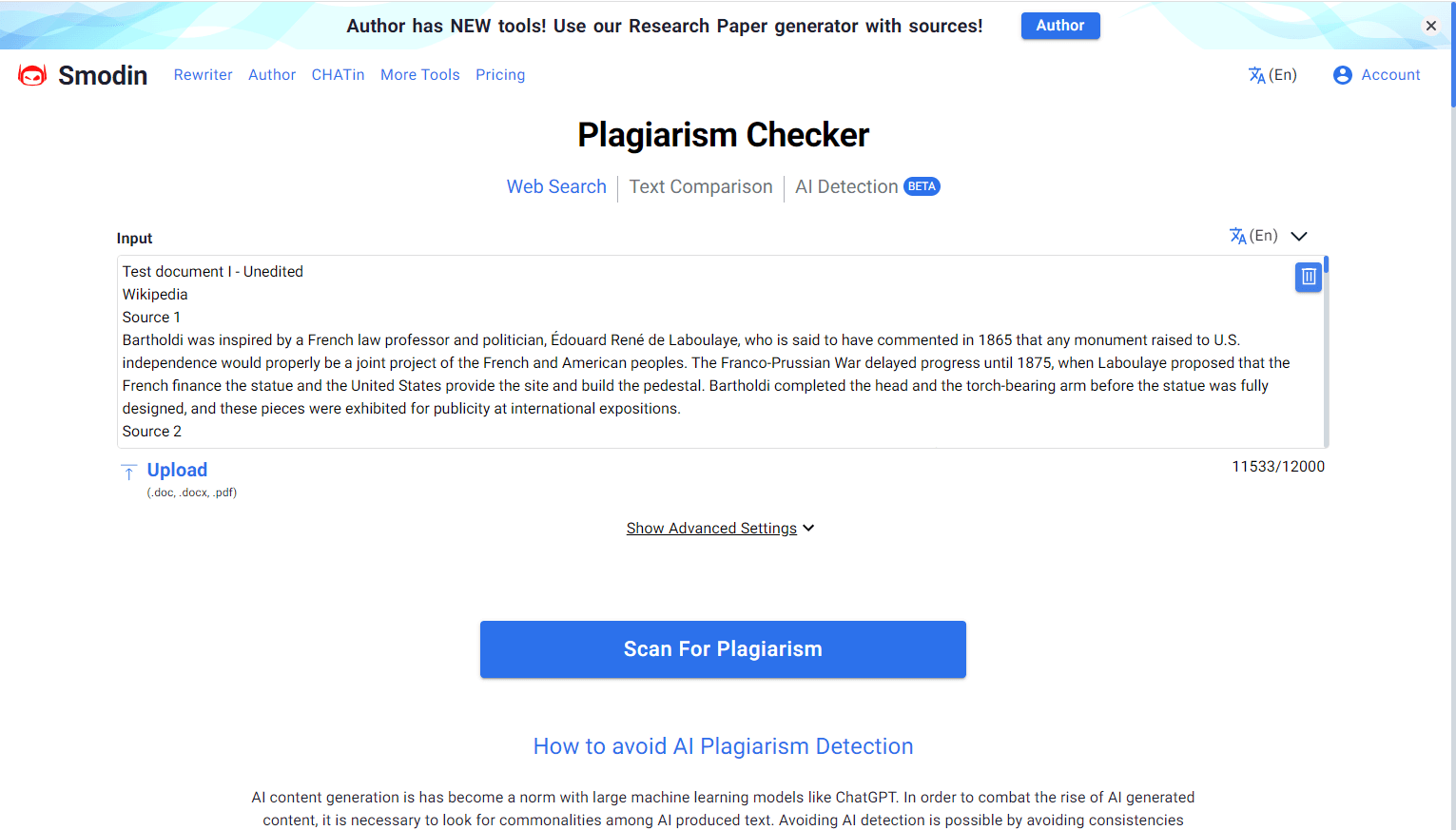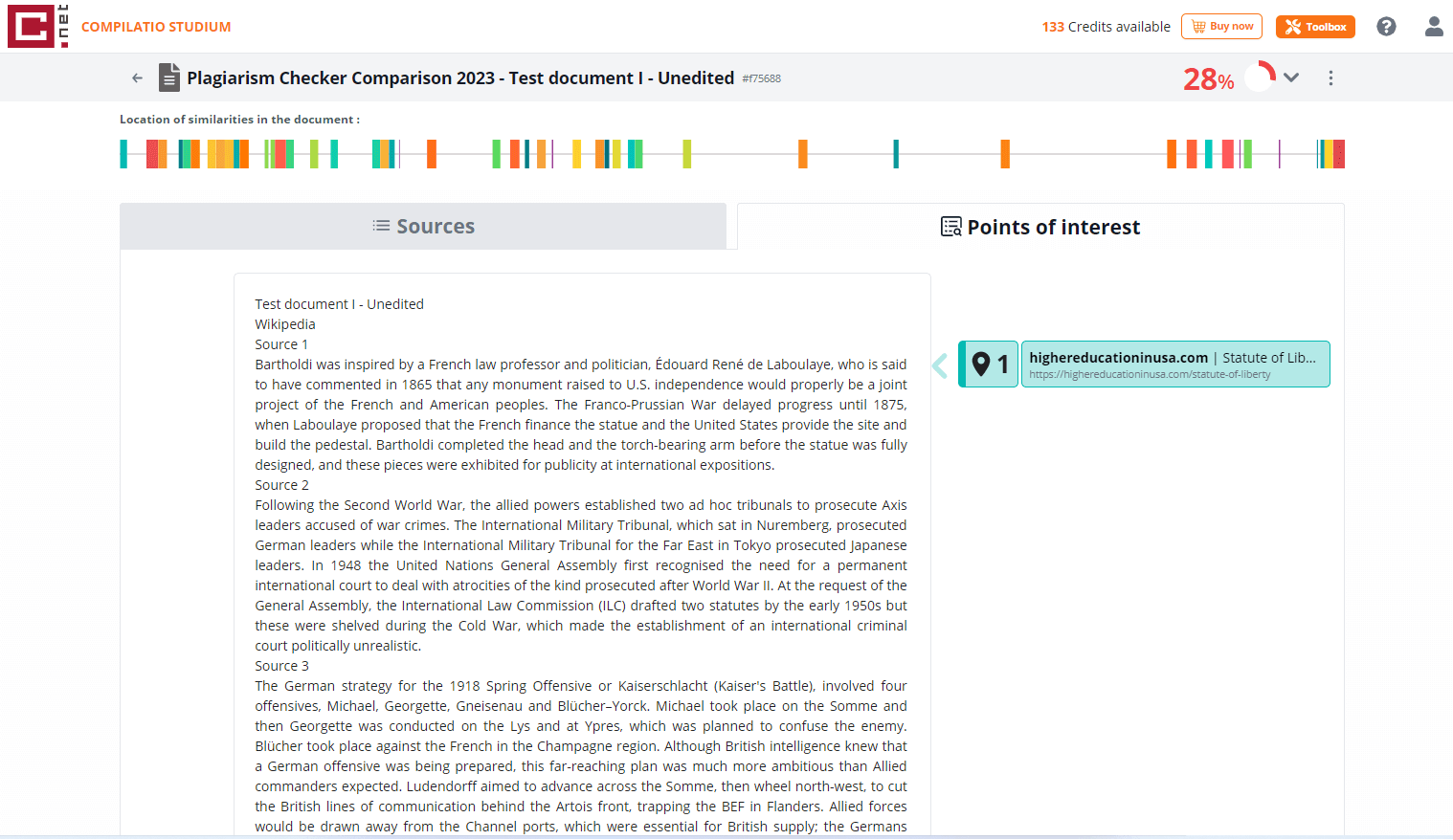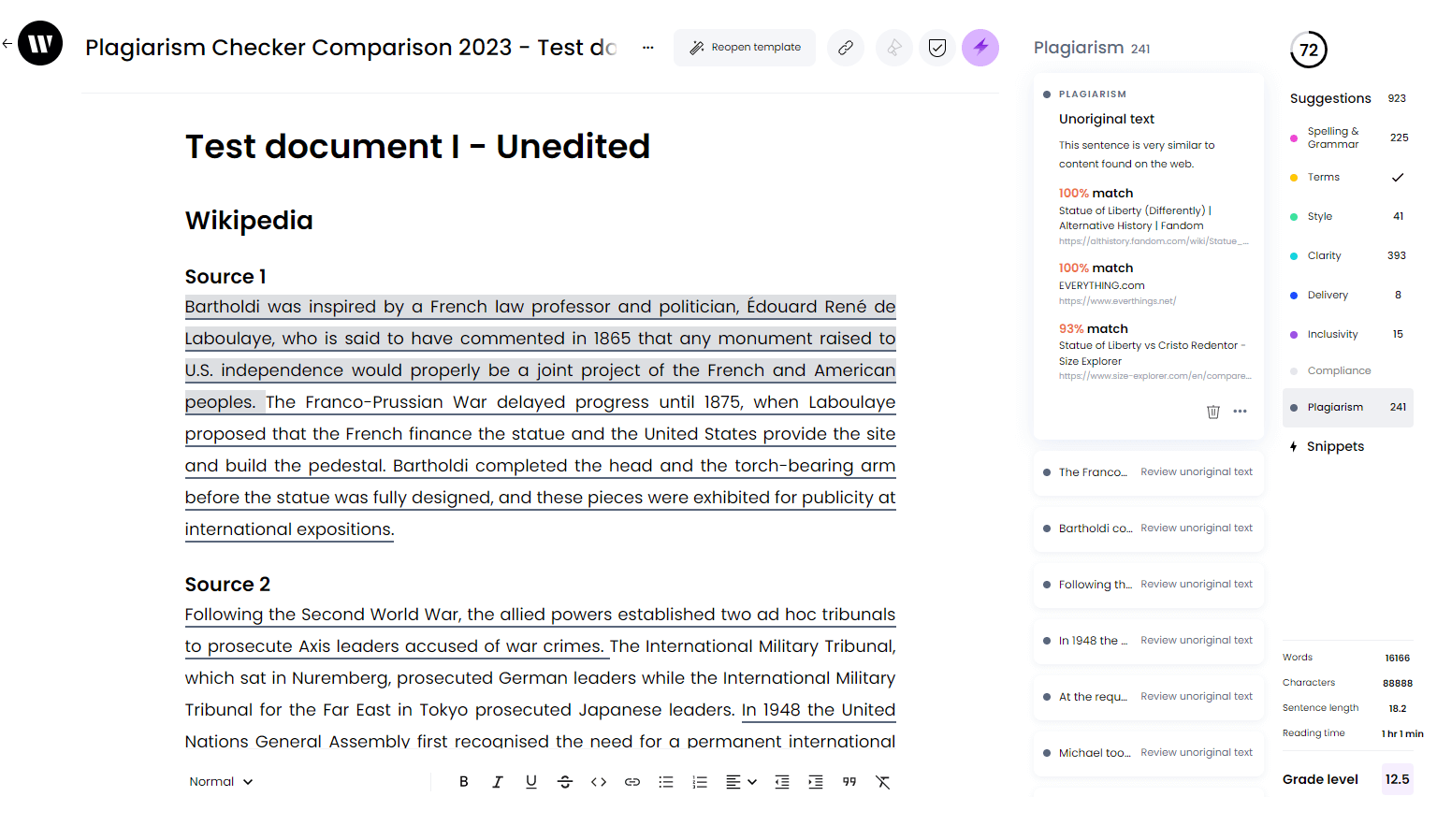Best Plagiarism Checkers of 2023 Compared
The best plagiarism checker should be able to detect plagiarism the most accurately, even if the original phrasing has been altered. The tool should also provide a clear, comprehensive plagiarism report.
To identify which plagiarism checker is best, we conducted in-depth research comparing the performance of 10 checkers. We uploaded plagiarized texts that were either directly copied and pasted or edited to varying degrees. In total, we used 140 sources to construct our test documents.
Overview of total scores per plagiarism checker, based on the amount of detected plagiarism:
| Plagiarism checker | Overall score |
|---|---|
| 1. Scribbr (in partnership with Turnitin) | 4.2 |
| 2. Plagaware | 2.9 |
| 3. Quetext | 2.5 |
| 4. Viper | 2.2 |
| 5. Grammarly | 2.0 |
| 6. Plagiarism Detector | 2.0 |
| 7. Copyleaks | 1.7 |
| 8. Smodin | 1.6 |
| 9. Compilatio | 1.5 |
| 10. Writer | 1.4 |
Our process for comparing checkers
In order to find the best plagiarism checker, we analyzed different aspects of the tools, focusing on both depth and breadth.
We based our analysis on the following factors:
- Access to the biggest and most varied database
- Ability to detect the most plagiarism for the most source types
- Ability to detect plagiarism when the plagiarized texts have been paraphrased
- Highest quality of matches
- Level of user-friendliness and trustworthiness
We used the same test documents, test date (April/May 2023), evaluation criteria, and data analysis for each tool in order to objectively compare the plagiarism results side by side. This ensured that the results required very little interpretation on our part.
Also see our list of the best free plagiarism checkers and the best AI detectors.
1. Scribbr review
“Catches plagiarism more accurately than any other checker”
Pros
- Finds the most plagiarism and works for edited texts, too
- Does not store or sell documents
- Offers a happiness guarantee and live support
- Offers a Self-Plagiarism Checker to check for self-plagiarism
- Offers a limited free version
Cons
- Quality comes at a price
- Cannot work directly in the tool
Quality of matches
Scribbr performed well for all source types relevant to students, such as journal articles and dissertations.
Most importantly, Scribbr’s checker was the most successful at detecting plagiarism in source texts that had been heavily edited to mimic accidental paraphrasing plagiarism.
Scribbr was also able to find full matches. This means the entire plagiarized portion is matched correctly to just one source, rather than multiple incorrect sources.
Usability
The results are presented in a clear, downloadable overview. Different colors are used for different sources, making it easy for users to assess each plagiarism issue separately.
Issues can be fixed with Scribbr’s free citation generator, which generates proper citations for any missed or improperly cited sources.
Users can also choose to combine the Plagiarism Checker with the Self-Plagiarism Checker, which is unique to Scribbr. This tool allows users to upload their own unpublished documents in addition to the public database.
Instead of requiring users to subscribe to their services, Scribbr charges per plagiarism check ($19.95–$39.95, depending on the word count).
However, users are unable to work directly in the tool, and it is not possible to re-check your document for free.
Trustworthiness
Scribbr does not store the uploaded documents, sell them to third parties, or share them with academic institutions. Data is automatically deleted after 30 days, or students can opt to manually delete their document after the check.
Scribbr has live and responsive customer support to assist students in multiple languages. There is easy access to a plagiarism checker guide and other free resources about plagiarism.
Scribbr also has a happiness guarantee, where students receive a new check or refund if they aren’t satisfied for any reason.
Try Scribbr’s Plagiarism Checker now
2. Plagaware review
Pros
- Detects most of the plagiarism
- Documents not stored in database
- Multiple support options, but no live support
Cons
- Difficult to read PDF reports
- Does not work well for scholarly sources
Quality of matches
Plagaware was often able to find full matches and attribute the text to the correct source. However, it performed poorly with heavily edited texts.
Sometimes, the tool did not correctly distinguish between separate plagiarized sources (i.e., it incorrectly attributed two consecutive paragraphs to the same source).
Usability
The website report is easy to navigate as it uses different colors for sources. The tool has a function that tells you how many words a plagiarized section has and gives a similarity percentage.
Unfortunately, the downloadable report is confusing to read as it uses only one color and doesn’t clearly link plagiarized text with a source.
Trustworthiness
Plagaware does not store files and does not sell uploaded content. Their website contains a contact form and phone number.
Discover Plagaware’s plagiarism checker
3. Quetext review
Pros
- Users can work directly in the tool
- Offers a citation assistant that helps with adding missing citations
- Does not store or sell documents
Cons
- Partial matches where one source text is matched to multiple sources
- Does not work well for scholarly sources
- Reports are hard to read
Quality of matches
Quetext detected about half the plagiarized text but was often unable to fully match the entire source text to one source. Instead, individual sentences get attributed to different sources.
The website states that Quetext checks against webpages and academic sources, but the tool does not in fact perform well for academic sources.
The website report sometimes did not correctly distinguish between plagiarized paragraphs and attributed them to the same source.
Usability
Quetext differentiates by severity of plagiarism in its online report: orange for partial matches and red for full matches. Otherwise, the same colors are used for different sources.
Users can work directly in the tool, and Quetext offers a citation assistant that helps generate the missing citations.
The original layout of the text is lost in both the website report and the downloadable report.
Trustworthiness
The tool does not store or re-upload your text, and it offers a help center with FAQs. There is no live support, but users can submit a help request on the website.
Discover Quetext’s plagiarism checker
4. Viper review
Pros
- Ability to compare your newest document with previously uploaded documents
- Different colors for different source types
Cons
- Documents get published on external websites if you use the free version
- Performs poorly for scholarly sources
- Report can be hard to read, due to partial matches
Quality of matches
Viper found about half of the plagiarism when the source text was directly copied or lightly edited, but it struggled to find plagiarism in moderately and heavily edited texts.
The tool had average performance for most source types but struggled specifically with scholarly source types such as journal articles and dissertations. This makes this tool less useful for students.
Usability
When Viper flagged plagiarism, it often matched the entire passage to one source. While the downloadable report was somewhat difficult to read, it helpfully uses different colors for different sources.
Viper also allows users to check their text against their own previously uploaded documents, which may help to catch instances of self-plagiarism.
Trustworthiness
Viper stores previous submissions and shows matches with those texts.
The tool does not sell your document if you use the paid version (prices start at $3.95 per 5,000 words). However, if you use the free version, the document is uploaded to an internal database. After three months, the text is published on an external website as an example for other students. This is not good if the content of your text is confidential.
Viper does not have live support, but there is a contact form on the website.
Discover Viper’s plagiarism checker
5. Grammarly review
Pros
- Offers a language and citation assistant
- Does not sell or share documents with other parties
Cons
- Finds quite a low percentage of plagiarism
- 100,000 character limit (14,000–25,000 words)
- Same colors for different sources
Quality of matches
Grammarly found a relatively low amount of plagiarism. It performed best with lightly edited texts. However, it scored below 50% in all other rounds of testing.
When it did find plagiarism, the tool was often able to find the right source. However, the matches were usually only partial and rarely included the entire plagiarized section.
Usability
The design is not very clear. As the tool is primarily used as a language checker, the plagiarism checker function is somewhat difficult to find. The tool uses the same color for all sources, making it hard to read.
The subscription comes with a language and style tool and offers a citation assistant that helps generate the missing citations. In addition, there is a 100,000 character limit for both the monthly plan ($30 per month) and the yearly plan ($12 per month).
Trustworthiness
Grammarly does not store, sell, or share documents with other parties.
There is a support page with tips, tutorials, and FAQs, and it is possible to submit a question via a form. However, there is no live support.
Discover Grammarly’s plagiarism checker
6. Plagiarism Detector review
Pros
- Does not store or sell your document
Cons
- Difficult to find the plagiarized source in the report
- Same highlight colors for different sources
- Technical difficulties generating the report, and no live support
Quality of matches
This tool had difficulty uploading the document for each round of testing (for the first round, it took over six hours to generate a report). It seems that Plagiarism Detector was unable to adequately process a document of this size, even though the document did not exceed their word limit of 25,000.
This tool was mostly only able to find partial matches, attributing individual sentences to one or more sources, rather than the entire section.
Usability
In the downloadable report, the format of the text is lost, making it hard to read. The list of sources is also difficult to cross-reference with the text above because the same colors are used for different sources.
Plagiarism Detector offers a rewrite tool to help resolve similarities, but the quality of this tool is questionable, and it does not help with the citation issues. You should resolve plagiarism by citing the relevant source, not by attempting to rewrite the text to disguise it.
Trustworthiness
Plagiarism Detector does not store or sell uploaded documents. There is no live support, but the website does offer a help request form.
Discover Plagiarism Detector’s plagiarism checker
7. Copyleaks review
Pros
- Text layout is kept intact in the online tool
Cons
- Difficult to read reports
- Performed poorly with academic sources
- Unclear data protection policy
Quality of matches
Copyleaks performed relatively poorly with all source types. It lists multiple possible sources for flagged sentences. However, it was sometimes able to attribute an entire source block to the correct source.
The report distinguishes between text that is “identical” to a source, text that contains “minor changes,” and text that is “paraphrased.” However, its judgment is sometimes wrong.
Usability
The site report and downloadable report differed (the downloaded report flagged content that was not flagged on the site report). On the website report, the source information function did not always work correctly, so it was sometimes impossible to check the accuracy of the attributions.
The reports were also difficult to read, as they use the same color highlights for all sources. While the source formatting is maintained in the online tool, it is altered in the downloadable report.
Trustworthiness
Copyleaks claim that they “will never steal your work.” To permanently remove uploaded content from their database, users must contact customer support. The website has a chat option and a contact form.
Discover Copyleaks’ plagiarism checker
8. Smodin review
Pros
- Site has a citation generator
Cons
- Very low word limit
- Report is difficult to read
- Scans individual sentences rather than full texts
- Unclear data protection policy
Quality of matches
Smodin performed relatively poorly in all rounds of testing. While it got some sources correct, it struggled to get full matches and frequently attributed the same text to multiple different sources. It did particularly poorly with scholarly sources.
Usability
The tool has a very low limit of 2,000 words per scan.
Both the online report and the downloadable PDF report are difficult to read. The downloadable report displays the uploaded document, but it doesn’t highlight the text that it flags as plagiarized. Instead, below this, it includes the individual parts of the text that it recognizes as plagiarism.
However, it is difficult to read as the same text is repeated over and over again if multiple sources were found for it. The sources also do not seem to be in a logical order.
Trustworthiness
Their data protection policy suggests they can/might sell or repurpose uploaded content. There is no live support, but there is a contact form on the site.
Discover Smodin’s plagiarism checker
9. Compilatio review
Pros
- You can use your credits for multiple documents
- Scans against other documents you have uploaded
Cons
- Doesn’t highlight the plagiarized parts in the text
- Hard to review and resolve instances of plagiarism
Quality of matches
Compilatio was able to find a few of the plagiarized sources, but it struggled if the source text had been moderately or heavily edited. However, when it was able to identify a source, it was often correct.
It was not possible to determine how accurately Compilatio could match the source to a plagiarized source text, since the plagiarized parts were not highlighted. Instead, the report only shows the general area that matches the source. This may limit its helpfulness to users, since it’s hard to review and resolve potential instances of plagiarism.
Usability
As the report does not highlight the flagged text, it does not provide a good overview of the potential issues. Additionally, you cannot work in the tool, so it’s not possible to exclude similarities from the report.
The tool scans the text against other documents you have uploaded, which can help to avoid self-plagiarism.
Users can buy packages for 5,000 words for €3.99 (no $ value is available on the site), 25,000 words for €14.99, or 50,000 words for €24.99. These credits can be used for multiple documents and are valid for 12 months after purchase.
Trustworthiness
Compilatio does not share or sell submitted documents, and the documents are not used as comparison material for other users.
There is no live support available, but they do provide a helpdesk with FAQs and a request form.
Discover Compilatio’s plagiarism checker
10. Writer review
Pros
- Part of a tool with many other useful functions
- Allows you to edit in the tool
- Text format is not altered
Cons
- Doesn’t find much plagiarism
- Doesn’t provide a downloadable report
Quality of matches
This tool found very little plagiarism. It struggled particularly with scholarly sources like dissertations and academic journals.
It scans sentence by sentence, rather than whole paragraphs. As a result, the plagiarized text is often attributed to multiple sources, rather than just one.
Usability
The plagiarism checker function is part of a larger language tool that provides grammar and spelling checks. As the tool doesn’t display an overall plagiarism percentage, we couldn’t apply our normal testing methodology.
The tool has a nice, clean design and was relatively easy to use. The format of the text remains intact, and you can work directly in the tool. However, it doesn’t provide a downloadable report, so you must work solely on the website.
Trustworthiness
Writer claims that its tool is secure and safe to use and that it won’t share your information with anybody. A detailed security policy is described on a separate page.
They provide a contact number and email address on the site, but no live support.
Discover Writer’s plagiarism checker
Go back to the best plagiarism checker
Frequently asked questions about plagiarism checkers
- How is plagiarism detected?
-
Plagiarism can be detected by your professor or readers if the tone, formatting, or style of your text is different in different parts of your paper, or if they’re familiar with the plagiarized source.
Many universities also use plagiarism detection software like Turnitin’s, which compares your text to a large database of other sources, flagging any similarities that come up.
It can be easier than you think to commit plagiarism by accident. Consider using a plagiarism checker prior to submitting your paper to ensure you haven’t missed any citations.
- Are plagiarism checkers accurate?
-
The accuracy depends on the plagiarism checker you use. Per our in-depth research, Scribbr is the most accurate plagiarism checker. Many free plagiarism checkers fail to detect all plagiarism or falsely flag text as plagiarism.
Plagiarism checkers work by using advanced database software to scan for matches between your text and existing texts. Their accuracy is determined by two factors: the algorithm (which recognizes the plagiarism) and the size of the database (with which your document is compared).
- Can you use Turnitin for free?
-
Yes, Scribbr offers a limited free version of its plagiarism checker in partnership with Turnitin. It uses Turnitin’s industry-leading plagiarism detection technology and has access to most content databases.
If you’re a university representative, you can contact the sales department of Turnitin.
- To which databases will my document be compared?
-
Your document will be compared to the world’s largest and fastest-growing content database, containing over:
- 99.3 billion current and historical webpages.
- 8 million publications from more than 1,700 publishers such as Springer, IEEE, Elsevier, Wiley-Blackwell, and Taylor & Francis.
Note: Scribbr does not have access to Turnitin’s global database with student papers. Only your university can add and compare submissions to this database.
Cite this Scribbr article
If you want to cite this source, you can copy and paste the citation or click the “Cite this Scribbr article” button to automatically add the citation to our free Citation Generator.
Driessen, K. (2023, June 07). Best Plagiarism Checkers of 2023 Compared. Scribbr. Retrieved April 22, 2024, from https://www.scribbr.com/plagiarism/best-plagiarism-checker/
